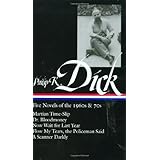
Average Reviews:

(More customer reviews)Are you looking to buy Philip K. Dick: Five Novels of the 1960s & 70s? Here is the right place to find the great deals. we can offer discounts of up to 90% on Philip K. Dick: Five Novels of the 1960s & 70s. Check out the link below:
>> Click Here to See Compare Prices and Get the Best Offers
Philip K. Dick: Five Novels of the 1960s & 70s ReviewProlific. Consistently thought-provoking. Scintillatingly brilliant with uncanny frequency. Hilarious. Living an adult life mostly in poverty but surrounded by many caring people. A binge fiction writer, letter-writer, and talker.This was Philip K. Dick. He was kind enough to correspond several times with a nerdy high-school senior who had written a ten-page analysis of three of his major works.
That was me.
PKD's heart would soar at being included in a series of books featuring Melville, Faulkner, Fitzgerald, Hawthorne, and Thoreau. This latest volume includes FLOW MY TEARS, THE POLICEMAN SAID, still one of my favorites and the novel that sent me on my own binge of PKD reading.
With an oeuvre of over fifty novels, voluminous short stories, philosophical essays, and a final tome, THE EXEGESIS, which may resemble Prokofiev's Symphony Number 2 in its gargantuan length and ultimate inaccessibility for most fans, Philip K. Dick was a ceaseless writer who found revision a nearly impossible process.
His works are structured by his brilliant mind that thought aloud on paper in the form of stories that questioned the nature of reality but that also revealed a profound love for most of humanity. To read PKD is to become more deeply attuned to what it is to be human--to become an explorer held in suspense by a psychological realist who fabulated fantastic worlds that were strangely familiar.
PKD's best works--five of which are included in this latest volume--are a joy to read. Because he wrote fast and didn't often revise, these are blemished works of art. But all of us are similarly blemished: it's the nature of being human. Brilliance radiates even on pages where archaic slang, incorrect predictions, and other flaws are rife.
One leaves PKD's novels wishing that one could still talk to, correspond with, or hear lecture the author--or simply read brand-new examples of this genius's work. Even with his vast output, one wants more.
One cannot leave the pages of PKD without feeling a strange, perhaps singular, intimacy. These novels incarnate the mind of that brilliant friend who lives nearby and raids your medicine cabinet if you're not looking.
If one is attuned, one leaves the novels of PKD not just loving the words but also loving the man who wrote them, flawed as he may have been.
Rereading FLOW MY TEARS, THE POLICEMAN SAID for the first time in twenty years, I discovered how much I myself had changed. The jokes had a different tone; the philosophical and psychological dimensions had taken on different shadings and colors. But the engaging ideas, the idiosyncratic but compelling characters, and the sheer energy of the novel convinced me yet again that I was in the presence of a mind that never ceased to teach. Dick, a student of so many disciplines, channelled his deepest loves and fears into his books, and we, the lucky readers alive today who continue to peruse his pages, have been given by PKD a gift similar to Mary Anne Dominic's blue vase at the end of FLOW...-- works of enduring art that are loved by many.
I'm grateful that the Internet was unavailable to PKD: it might have ruined his output of novels and stories.
But I wish I could see the joy and pride on his face at having two volumes (so far) dedicated to his best work.
Emerson himself merited only two volumes.Philip K. Dick: Five Novels of the 1960s & 70s Overview
Want to learn more information about Philip K. Dick: Five Novels of the 1960s & 70s?
>> Click Here to See All Customer Reviews & Ratings Now
0 comments:
Post a Comment